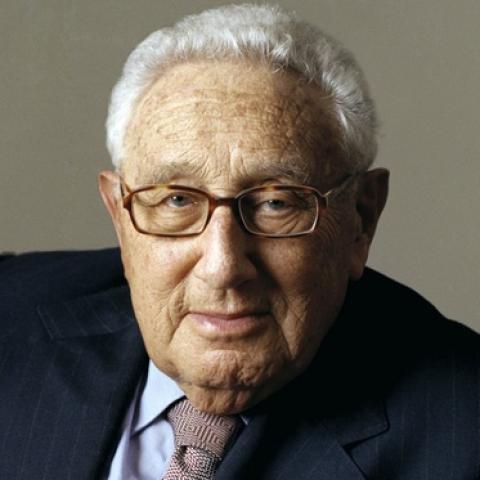I once introduced Lord Carrington in England with rare eloquence and when I was finished he said, I can hardly wait to hear what I'm going to say.
I also should point out in fairness, that for a while, I was both security adviser and secretary of state. And never before and never since have relations between the White House and the State Department been this harmonious as they were in those days.
It's a great honor for me to say a few words at the Hudson Institute and about Rupert Murdoch. We live in a period of not just extraordinary complexity, but of an absence of a sense of direction. And the Hudson Institute has been dedicated to developing the concepts. And Rupert Murdoch has had the courage to stand alone on occasion in developing a set of journals in which the fundamental needs of our period ([which] I discussed systematically) and in which others who do not share conventional wisdom can find a place and are welcome.
Never before in history have the various parts of the world been able to interact with each other. And, therefore, one doesn't know whether there was ever a period in which every part of the world seemed to be in upheaval simultaneously. And what makes the situation more complex is that the nature of these upheavals is not identical.
In the Middle East at this moment, there are a whole series of revolutions going on simultaneously. Upheavals against the domestic structure of existing states. Upheavals between ethnic groups within existing states. Upheavals between religious groups within existing states and across state boundaries. Upheavals against the state structure and what's created at the end of the first World War. And the impact of outside countries like Russia and, to some extent, Iran, if it can be treated as an outside country. [These countries are] pursuing their own geostrategic objectives.
And in this situation, if the United States does not exercise some degree of leadership, it is certain that the chaos will spread and will become more and more inimical to our own values. And the beginning of an American leadership has to be the destruction of ISIS. That is not the end of a policy, it has to be the beginning of it.
At the same time, China is attempting to find a definition for itself in a world in which it has never participated. It's part of an international system, and in which it now will emerge as one of the principal countries, and one of the challenges for our future is whether this relationship will become permanently adversarial or can lead to some degree of cooperation.
But what, at this moment, worries me most is the condition of Europe. For hundreds of years, Europe was the principal continent shaping international relations. For hundreds of years Europe developed concepts which have been unique to the west, namely a certain separation between the states and religion and certain standards of legitimacy, which restrained conduct between nations and a concept of the balance of power between groups of states of comparable strength.
Much of this disappeared by the end of World War II, but the worrisome aspect of the current situation is that the borders between Europe and other civilizations seem to be collapsing, and that one can see, in a not too distant future, a transformation of these societies which will change the fate of the world.
In all of these challenges, it is essential that the United States, with its history of democracy and its commitment to world order play a significant role.
And history will not permit the United States to lead from behind.
We cannot avoid answering the question of what are we trying to prevent in this world and what are we trying to achieve, because if we are not able to answer these questions, we will be overwhelmed by forces that are gaining tremendous dynamism.
Now, I've gone into a sketch of my present concerns because it explains my admiration for Rupert Murdoch. I worked in government at a time when it was not easy for people of a conservative view to be assured of a consistent hearing and the contribution that Rupert and the Fox Network are making by establishing a clear, alternative point of view is absolutely essential for our future.
Throughout his life, Rupert has taken charge of his life and he has created from minimal beginnings a set of institutions that spread across the world, but he has never been satisfied with mere material success. Wherever he has been active, and above all in the United States in the last decade, he has provided a thoughtful alternative to conventional wisdom, a strong point of view and a courageous stand in sometimes difficult situations.
And so for any of us who have served in government when these conditions did not exist and for all of us who are aware of the challenge before us, Rupert Murdoch is an inspiration and we owe him a great debt of gratitude.
And I'd like to add another word. Of course, Rupert is an impressive man and he has done great things and we all owe him a great deal for what he has built, but if I may say a personal word. I like him as a human being.
I like his warmth, his dedication, even his apparent diffidence in private conversations. And so I want to thank the Hudson Institute to give me this opportunity to present the Global Leadership Award to a man who means a lot to our country, to whom we owe a great deal and who has made my life and Nancy's a much more meaningful one.
So Rupert, I don't know whether I have to hand you something.



















